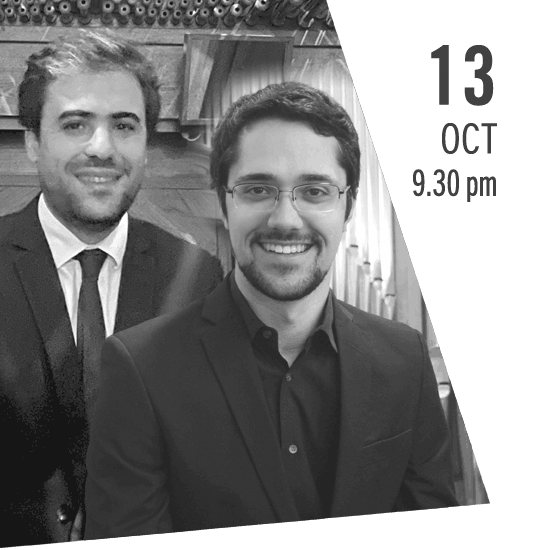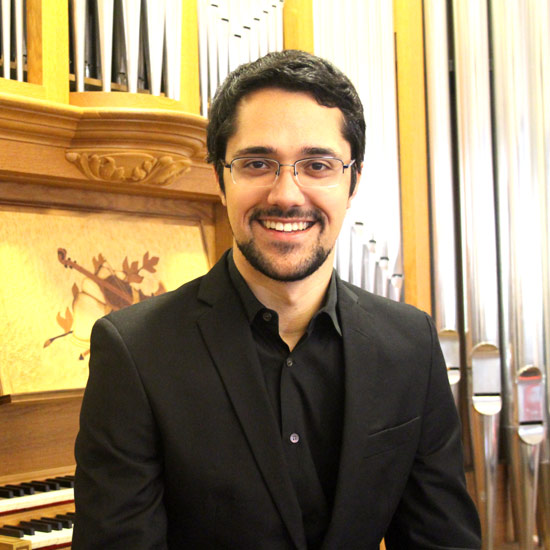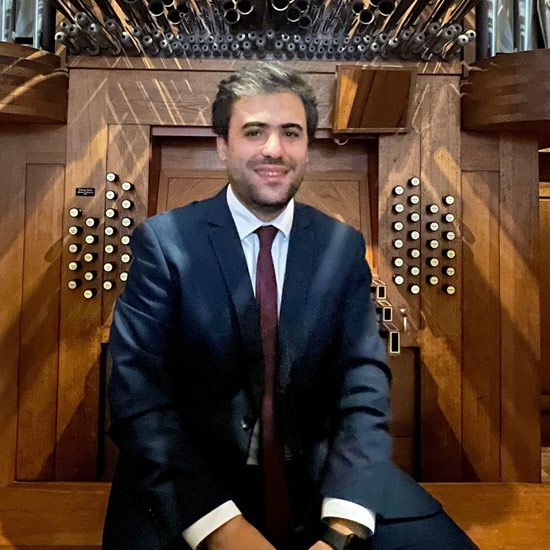 October 13, Friday, 9.30 pm;
October 13, Friday, 9.30 pm;
Igreja de São João Evangelista (Colégio) · Funchal;
DOUBLE FANTAISIE – MUSIC FOR FOUR HANDS AND FOUR FEET
Organ four hands and four feet;
Samuel Pinto & Gregório Gomes, organ;
The genesis of the idea of today’s concert goes back to a project carried out within the context of a cycle of studies at the Higher School of Music in Lisbon, works for four hands and four feet. This having proved successful, the idea subsequently arose of reproducing the project in other context. Since then, the performers have given concerts and cycles in music festivals in Mafra, Braga, Oporto and now Madeira. The programme is divided into two equal parts, in the first works from the baroque, classical and early romantic periods, and in the second works from later periods. This division also takes into account performance methodolody – while in the first part the use of the hands and feet may be considered balanced, the same is not true in the second, in which two of the three works were conceived exclusively for performance by the feet – Waltzing Matilda by Roger Ampt and the Waltzes by Johann Strauß, arranged by Johann Mathias Michel. The first, written in the form of a theme and variations, makes use of a popular Australian theme from the end of the 19th century. Each variation has its own character in this plurifaceted work. The second brings together three waltzes from the Viennese composer of the 19th century, in which the performers themselves are encouraged to do some dancing. This work also fits into the category of trancriptions/arrangements for organ for four hands and four feet, in which may also be included the movement in the form of a Concerto by Johann Sebastian Bach. As a reference in the organ literature for four hands and four feet, the Sonata op. 30 by Gustav Merkel was written in 1857, as part of a composition competition, wining the first prize. The work is distinguished not only by its impressiveness, but by the clarity of its musical writing and the structure of each movement. The first essentially follows a ritornello form, still somewhat baroque in style; the second is binary in form (ABA’), more characteristic of the romantic period; the third is written in the form of a fugue, preceded by a short introduction. Smaller in dimensions, the Fantasia by Adolph Friedrich Hesse is a very similar work in terms of musical language, and serves as an introduction to this concert. Finally, the work by Jean Langlais, which inspired the concert’s title, Double fantaisie, explores various timbral facets of the organ. It may be divided into two contrasting parts: the first, of a highly meditative character, alternates between lyrical and mechanical passages; the second, in the form of a fugue, is lively and marked. The more modern style of this work expertly explores the tensions created by the harmony, by means of harmonic crescendos and decrescendos. There are polyphonic passages in four voices for the pedal, somewhat like that found in the works written exclusively for four feet. The finale is sudden and abrupt, in opposition to the static, almost suspended, opening.
Samuel Pinto
Program:
ADOLF FRIEDRICH HESSE (1809-1863)
Fantasie, op. 35
Adagio
Andante grazioso
Allegretto
JOHANN SEBASTIAN BACH (1685-1750)
Concerto in C major, BWV 595 (arranjo de Maurizio Machella)
GUSTAV ADOLF MERKEL (1827-1885)
Sonata nº 1, Op. 30
Allegro moderato
Adagio
Allegro com fuoco – piú moderato
JOHANN STRAUß, FILHO (1825-1899)
Waltzes for four feet (arranjo de Johann Mathias Michel)
JEAN LANGLAIS (1907-1991)
Double fantaisie
ROGER AMPT (1949)
Waltzing Matilda
Introduction and theme
Variation I – Playful
Variation II – Waltz fughetta
Variation III – Bold
Variation IV – Lament
Variation V - Finale
 Samuel Pinto
Samuel Pinto
Samuel Pinto was born in Oporto. He attended the general course of the Diocesan School of Liturgical Ministries of that city, where his greatest influence was that of António Mário Costa. At the same time, he attended the Regional Conservatoire Foundation of Gaia, where he finished the 8th degree of piano and musical education. He attended courses of Catholic sacred music and organ – pedagogy at the Hochschule für katholische Kirchenmusik und Musikpädagogik Regensburg, Germany, where he had Stefan Baier and Franz Josef Stoiber as teachers. He also concluded his masters in organ – performance at the same school, in which he was assistant teacher of musical theory and auditory training. Subseqently, he finished his masters in music teaching – organ variant at the Higher School of Music in Lisbon. He is a teacher on the National Course of Liturgical Music and a founding member of the Association of Sacred Music of Braga, at which he also teachers. He maintains a regular activity as a concert artist, also collaborating with various parishes and communities in the Dioceses of Oporto and Braga. In parallel with his musical activity, Samuel Pinto also studied mathematics at the Faculty of Sciences of the University of Oporto.
 Gregório Gomes
Gregório Gomes
Gregório Gomes was born in Venezuela. He began his musical studies at theOliveira de Azeméis Music Academy, where he studied musical education, piano and violin. Later, he took the course of the Diocesan Course of Liturgical Ministry of the Diocese of Oporto, where he studiedorgan, harmony and choral conducting with António Mário Costa. Under the same teacher, he took the 8th grade in organ at the Aveiro Conservatoire. He also studied on the 4th National Course of Liturgical Music, having as teachers António Esteireiro and Filipe Veríssimo. He finished his bachelors in harpsichord at the University of Minho, studying with Helder Sousa. He later took a masters in organ and performance at the University of Aveiro, under António Mota. Organist of the Cathedral of Oporto since November 2017, he has also collaborated in parishes in the diocese of Braga and Oporto. He taught at the Liturgical Music School of St Fructuosus between 2012 and 2018. He is a founder member of the Associaton of Sacred Music of Braga, being also a teacher at this institution. He has given concerts, both as a soloist and as an accompanist, throughout the country.
